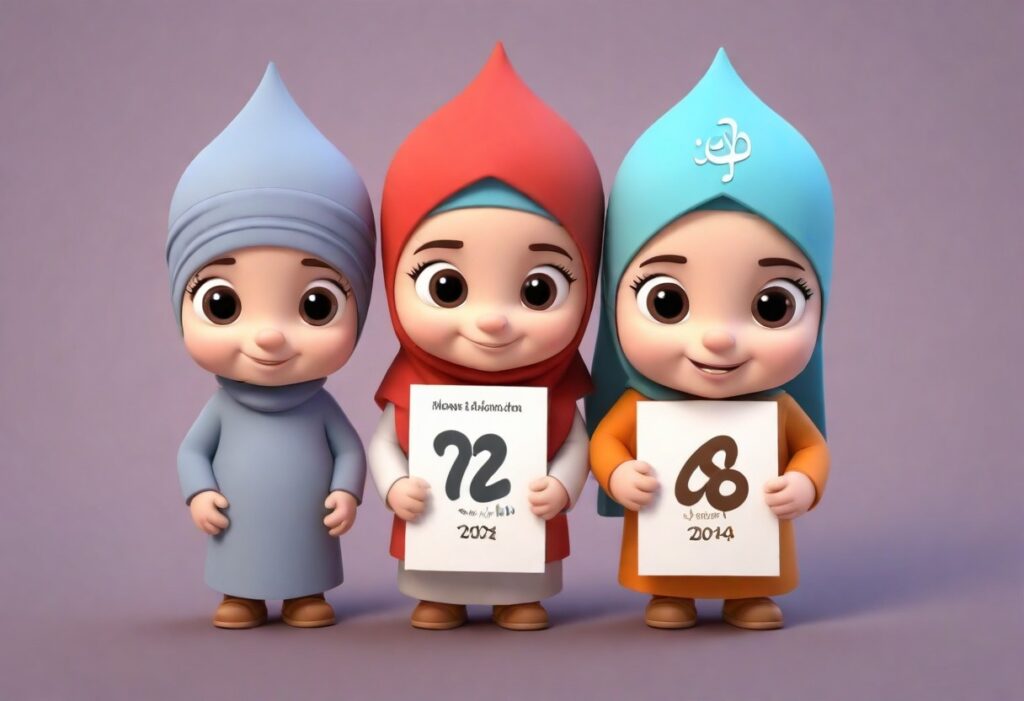Ramadan 2024: Dates, Significance, and Traditions – Your Complete Guide


Importance of Ramadan 2024: A Spiritual Journey
Ramadan, the holy month of fasting and spiritual reflection, is an essential time for Muslims worldwide. In 2024, During this sacred month, Muslims abstain from eating and drinking from sunrise to sunset, marking a period of intense devotion and self-reflection. The significance of Ramadan extends far beyond following its rigorous fasting rules; it is a time that offers Muslims an opportunity for spiritual growth and rejuvenation.
The fasting during Ramadan is not merely about physical abstinence from food and water. It is a time for Muslims to focus on their relationship with Allah swt, to seek repentance, and to deepen their understanding of faith. It provides a chance for introspection and self-discipline, helping to cultivate patience, empathy, and compassion towards others. Through self-restraint and sacrifice, Muslims learn to appreciate their bestowed blessings and develop a sense of gratitude.
Ramadan also serves as a time for building community and strengthening family bonds. Families come together to do iftar each evening, sharing meals and prayers. The evenings are filled with special prayers called Taraweeh(Qayamul layal), where the entire Quran is recited over the month. It is during these moments of communal worship and reflection that Muslims feel a sense of unity and connection with their fellow believers worldwide.
As Ramadan 2024 approaches, it is crucial to understand and respect the significance of this month for Muslims. It is a period of spiritual significance and personal growth, where individuals are encouraged to reflect on their actions, seek forgiveness, and strive for a closer relationship with Allah swt. Whether one observes Ramadan or not, promoting a better understanding of its practices and traditions can foster greater cultural understanding and tolerance in our diverse society.


Key Dates to Remember for Ramadan 2024
As the holiest month in Islam, Ramadan holds great significance for Muslims worldwide. To help you plan, here are some key dates to remember for Ramadan 2024.
The first important date is the beginning of Ramadan, which is determined by the sighting of the new moon which shows that Ramadan Kareem has started.
Another crucial date to remember is Laylat al-Qadr, also known as the Night of Power. It is believed to be the night when the first verses of the Quran were revealed to the Prophet Muhammad (SAWW). This night holds immense spiritual significance, and it is said that worship on this night is equivalent to worshiping for a thousand months. The exact date of Laylat al-Qadr is uncertain, but it is most commonly observed during the last ten nights of Ramadan, with the odd nights being more emphasized.
Eid al-Fitr, the festival of breaking the fast, is the most joyous occasion for Muslims. It marks the end of Ramadan and is celebrated with prayers, feasting, and exchanging gifts. In 2024, Eid al-Fitr is expected to fall in the evening depending on the sighting of the new moon. This day brings together families and communities, fostering a sense of unity and gratitude.
It is also important to note that during Ramadan, Muslims engage in additional acts of worship, such as Taraweeh prayers, which are performed after the Esha prayer. These prayers are conducted in the congregation and involve recitation of the Quran. Many masjid also organize special programs and lectures to enhance spiritual growth and understanding during this holy month.


Understanding the Significance of Fasting in Ramadan
Fasting is an important pillar of Islam, and during the holy month of Ramadan, Muslims around the world observe a month-long fast from dawn until sunset. This spiritual practice holds great significance and serves as a time for self-reflection, increased devotion, and strengthening one’s relationship with Allah. Understanding the rules for fasting Ramadan is essential for Muslims to fully observe this sacred time.
During Ramadan, Muslims abstain from food, drink, smoking, and other physical needs during daylight hours. This act of fasting is not only a demonstration of discipline but also a means to empathize with those less fortunate and develop compassion. It is a time of deep reflection and self-control, allowing individuals to consider their actions and seek forgiveness. It promotes a sense of unity among Muslims, as they come together in their commitment to the fast.
Observing the rules for fasting Ramadan is crucial for Muslims, as there are specific guidelines to follow. These rules include refraining from all forms of nourishment from dawn until sunset, including water and medications. Muslims are also encouraged to avoid negative actions and thoughts, as well as engage in additional prayers and recitation of the Quran. Through observing these rules, individuals can experience the spiritual growth and personal transformation that Ramadan offers.
Each year, the start date of Ramadan may vary based on the sighting of the moon, so it is important to be aware of the specific dates. For example, the Ramadan 2024 date may differ from previous years. It is recommended to consult local mosques or rely on accurate lunar calendars to determine the exact start and end dates of Ramadan.
understanding the significance and rules for fasting Ramadan is essential for Muslims. It goes beyond abstaining from food and drink; rather, it is a time for spiritual growth, increased devotion, and strengthening the relationship with Allah. Observing these rules helps cultivate self-discipline, empathy, and unity among Muslims worldwide. So, as the start of Ramadan approaches each year, it is important to be aware of the date and embrace this sacred month with reverence and gratitude.


Rules for fasting Ramadan
- The first rule is the intention to fast. Muslims must have the intention to fast from the sahoor, intending to abstain from food, drink, and other invalidating actions from dawn until sunset. This intention is a crucial aspect of the fast, as it signifies the individual’s commitment and sincerity.
- The second rule is abstaining from food and drink. Muslims are required to refrain from consuming any food or drink, including water, during the fasting hours. This includes avoiding smoking and chewing gum as well. It is important to note that the fast begins at dawn and ends at sunset, and it is essential to break the fast promptly at sunset.
- The third rule is avoiding invalidating actions. While fasting, Muslims must refrain from engaging in activities that nullify the fast. This includes avoiding sexual relations, intentionally vomiting, and deliberately swallowing anything, including medications, unless it is necessary for health reasons. It is important to consult with a religious authority or a healthcare professional if there are concerns about medication during fasting.
- The fourth rule is maintaining good behavior and avoiding sinful acts. Fasting is not only about abstaining from physical nourishment but also about purifying the soul and practicing self-discipline. Muslims are encouraged to refrain from engaging in gossip, lying, backbiting, and other negative behaviors. Instead, they should focus on acts of kindness, charity, and seeking forgiveness.
- The fifth rule is observing the prescribed prayer times. Muslims are required to perform the five daily prayers during Ramadan, in addition to any optional prayers. Prayer is an integral part of the fasting experience, as it helps to strengthen the connection with Allah and seek His guidance and blessings.
- The sixth rule is engaging in acts of worship and seeking knowledge. Ramadan is a time for increased devotion and spiritual growth. Muslims are encouraged to recite the Quran, engage in extra prayers such as Taraweeh, and seek knowledge through attending religious lectures and studying Islamic literature. This helps to deepen the understanding of the faith and strengthen the relationship with Allah.
- The seventh rule is Iftar with dates and water. It is recommended to break the fast with dates and water, following the example of the Prophet Muhammad. Dates provide a natural source of energy and help to replenish the body after a day of fasting. After breaking the fast, Muslims can proceed to have a balanced meal.
Observing the rules for fasting Ramadan is essential for Muslims to have a meaningful and spiritually enriching experience. By having the intention to fast, abstaining from food and drink, avoiding invalidating actions, maintaining good behavior, observing prayer times, engaging in acts of worship, and breaking the fast with dates and water, Muslims can fully embrace the essence of Ramadan and reap its numerous rewards. May this holy month bring blessings, forgiveness, and spiritual growth to all who observe it.


The Spirituality of Taraweeh Prayers in Ramadan
Ramadan, the holy month of fasting and devotion for Muslims all over the world, holds a special place in the hearts of believers. Lasting for a period of 29 or 30 days, depending on the sighting of the moon, Ramadan is a time of self-reflection, increased acts of worship, and seeking closeness to Allah. One of the most spiritually uplifting practices during this sacred month is the performance of Taraweeh prayers.
With the question of “How long is Ramadan?” looming, it is important to understand the significance of this sacred period. Ramadan lasts from dawn to sunset, during which time Muslims abstain from food, drink, and intimate relations. As the sun sets and Iftar (the breaking of the fast) takes place, believers then engage in Taraweeh prayers. These prayers are performed after Isha prayers and consist of reading portions of the Quran in the congregation.
The Taraweeh prayers are not obligatory, but they hold great spiritual significance for Muslims. The length of the Taraweeh prayers varies among different communities and mosques. Some complete the recitation of the entire Quran throughout the month, while others may recite fewer portions per night. Regardless of the duration, these prayers create a sense of unity, connection, and devotion among the worshippers.
During the Taraweeh prayers, Muslims experience a deep sense of spirituality and connection with Allah. The act of standing shoulder to shoulder with fellow believers, reciting the words of the Quran, and surrendering to the tranquility of the moment allows for inner reflection and purification of the soul. The Taraweeh prayers provide an opportunity to seek forgiveness, offer gratitude, and seek guidance from the Creator.
As Muslims observe the blessed month of Ramadan and abide by the fasting rules, Taraweeh prayers hold a special place in their spiritual journey. It is a time of heightened devotion, unity, and self-reflection. Regardless of the duration of the prayers, the spiritual connection experienced during Taraweeh is what truly matters, allowing believers to strengthen their bond with Allah and nourish their souls.


Charity and Giving Back in Ramadan 2024
Fasting during Ramadan has many rules and guidelines, such as abstaining from food and drink from dawn until sunset. It is not just about avoiding physical nourishment; it is also about purifying the mind and soul. Muslims practice self-control, patience, and empathy.
One of the fundamental principles of Ramadan is to give back to the community and help the less privileged. Muslims are encouraged to engage in acts of charity and kindness. This can include donating to humanitarian organizations, feeding the hungry, and supporting orphanages and shelters.
Ramadan teaches Muslims the importance of gratitude, empathy, and generosity. It is not just about personal spiritual growth, but also about fostering a sense of community and solidarity. By practicing these values, individuals not only contribute to the well-being of others but also deepen their understanding of compassion and empathy.
Ramadan 2024 offers a unique opportunity to reflect on our blessings, practice self-discipline, and make a positive difference in the lives of others. By observing the fasting rules, engaging in acts of charity, and embodying the spirit of giving, Muslims can truly embody the essence of this holy month. Let us use this time to come together, support one another, and make the world a better place.


Family and Community Bonding During Ramadan
It is not only a time for spiritual reflection and increased devotion, but also a time for family and community bonding. Ramadan brings families together in a unique way, fostering a sense of unity and togetherness.
Fasting during Ramadan rules are strict, with individuals refraining from eating or drinking anything during daylight hours. These rules are meant to instill discipline and self-control, but they also serve as an opportunity for families to come together for the pre-dawn meal, known as Suhoor, and the post-sunset meal, known as Iftar. These meals are often prepared and shared collectively, providing an opportunity for family members to connect and bond.
Furthermore, Ramadan is a time when communities come together to support one another. Mosques and Islamic centers organize Iftars for the community, where people from all walks of life gather to break their fast together. This communal meal not only strengthens the bond within the Muslim community, but it also provides an opportunity for non-Muslims to learn about the tradition and experience the warmth and hospitality of Ramadan.
The holy month of Ramadan lasts for 29 or 30 days, depending on the sighting of the moon. During this time, families and communities make an extra effort to engage in acts of kindness and charity. Many Muslims participate in charitable activities such as providing meals to the less fortunate, visiting the sick, and offering assistance to those in need. These acts not only strengthen family bonds but also reinforce a sense of community and social responsibility.
Ramadan is a month that goes beyond individual fasting and spiritual growth. It is a time when families come together to share meals, support one another, and strengthen their bonds. The community plays a pivotal role in ensuring that this holy month is celebrated with unity, love, and compassion. Through acts of kindness, charity, and communal meals, Muslims create an atmosphere that fosters family and community bonding during Ramadan.


Conclusion: Embracing the Holiness of Ramadan 2024
Ramadan, the sacred month of fasting observed by Muslims worldwide, is a time of reflection, self-discipline, and spiritual growth. As Ramadan 2024 comes to a close, it is important to reflect on the significance of this holy month and the lessons it has taught us. The fasting rules of Ramadan have not only provided us with physical challenges but have also bestowed upon us valuable spiritual insights.
The duration of Ramadan varies each year, as it follows the lunar calendar. In 2024, Ramadan lasted for approximately 30 days, from April 24th to May 23rd. This month-long journey encouraged Muslims to abstain from food, drink, and other physical needs from dawn till sunset. The long days and warm weather posed additional challenges during this year’s Ramadan, making the observance even more special.
However, Ramadan is not merely about abstaining from food and drink. It is a time to purify the soul, engage in acts of kindness, and deepen one’s connection with God. The fasting rules of Ramadan serve as a reminder to practice patience, empathy, and gratitude. By restraining ourselves from worldly pleasures, we develop a heightened sense of self-control and learn to appreciate the blessings we often take for granted.
As we bid farewell to Ramadan 2024, it is crucial to carry forward its teachings into our daily lives. The revelations obtained through fasting and prayer should not be forgotten but embedded in our hearts and actions. Let us embrace the holiness of Ramadan beyond the month itself and strive to maintain the spirit of this sacred observance throughout the year. May the lessons learned during Ramadan continue to guide us towards becoming better individuals and fostering harmony in our communities.
